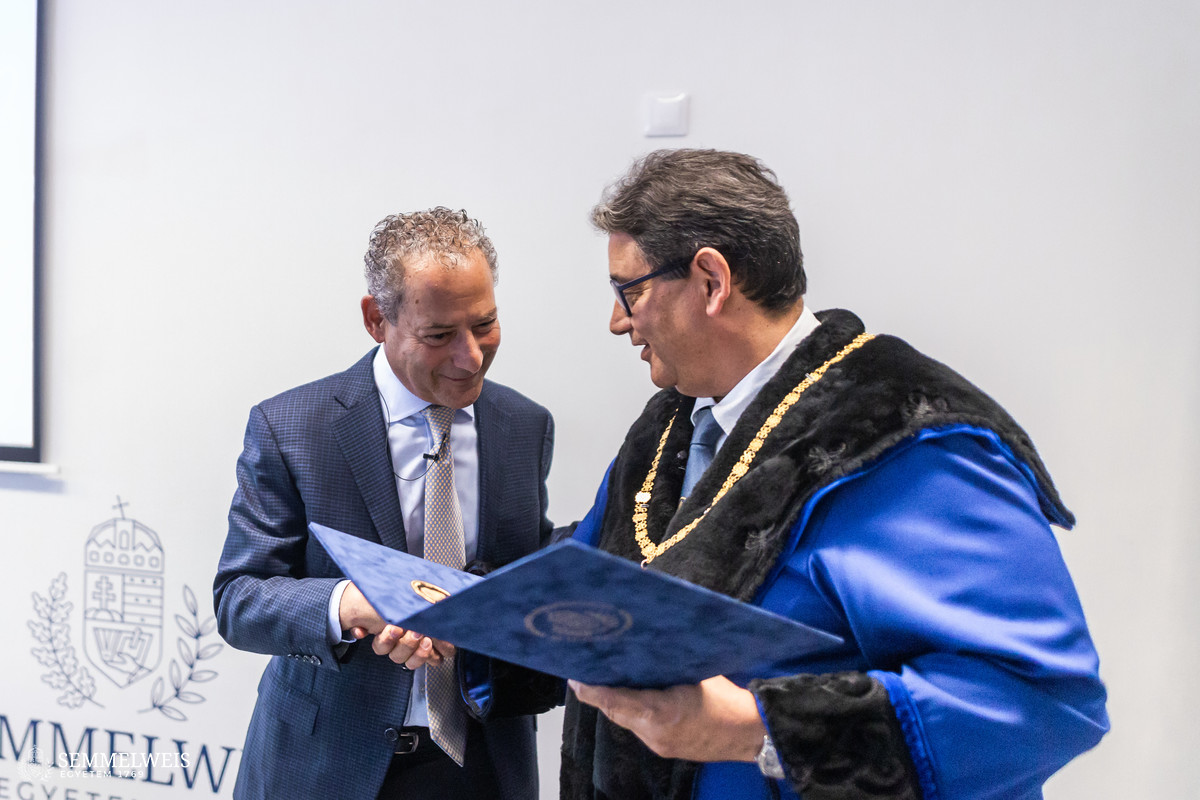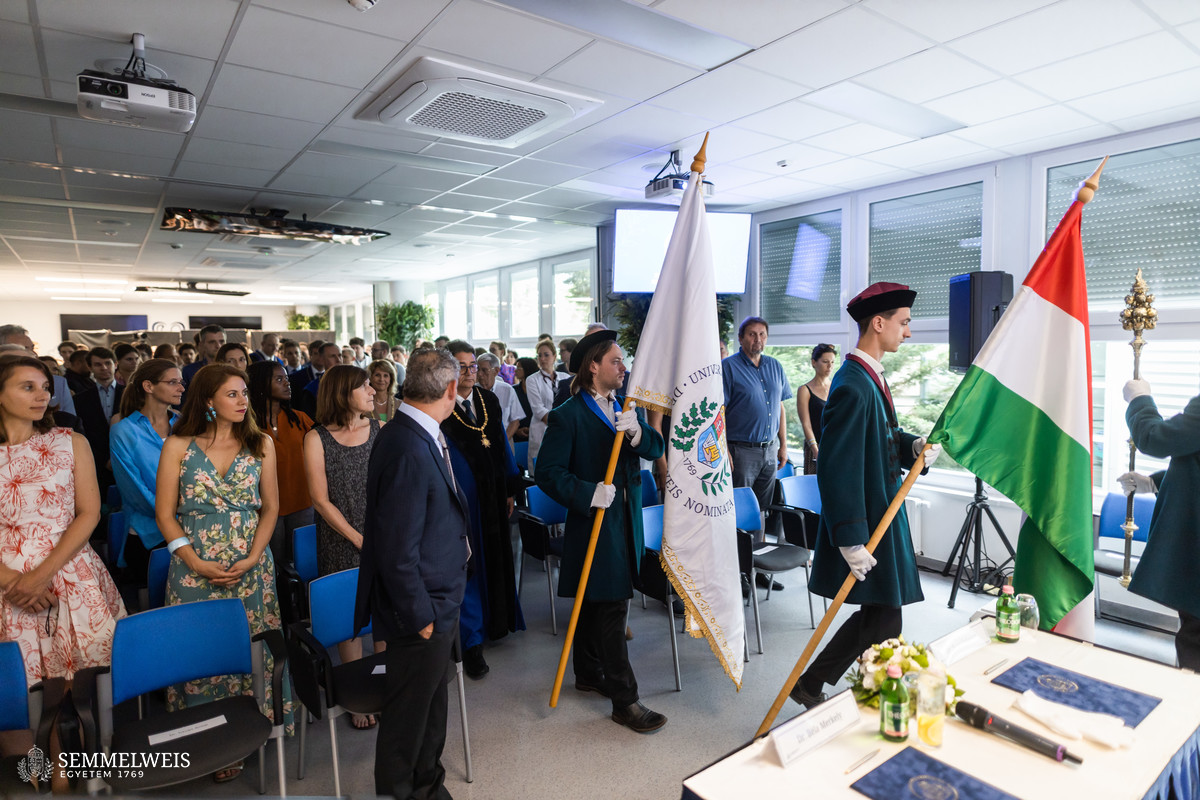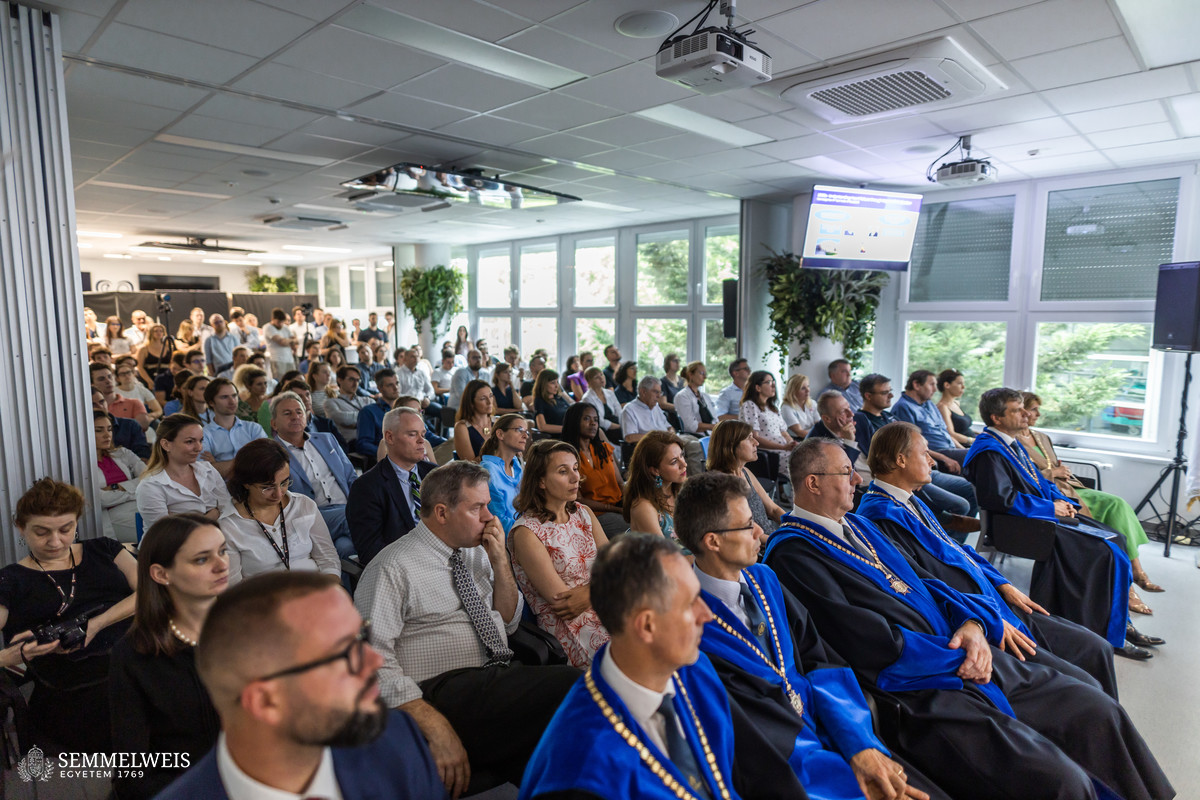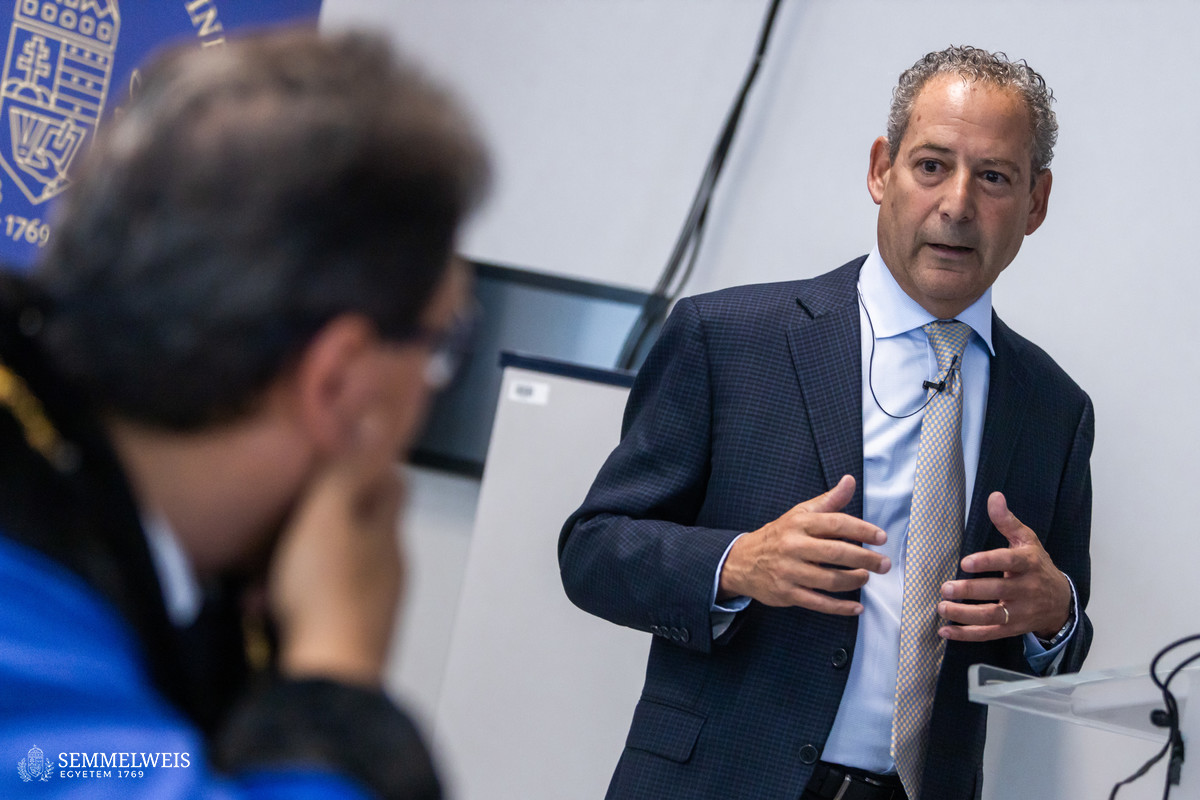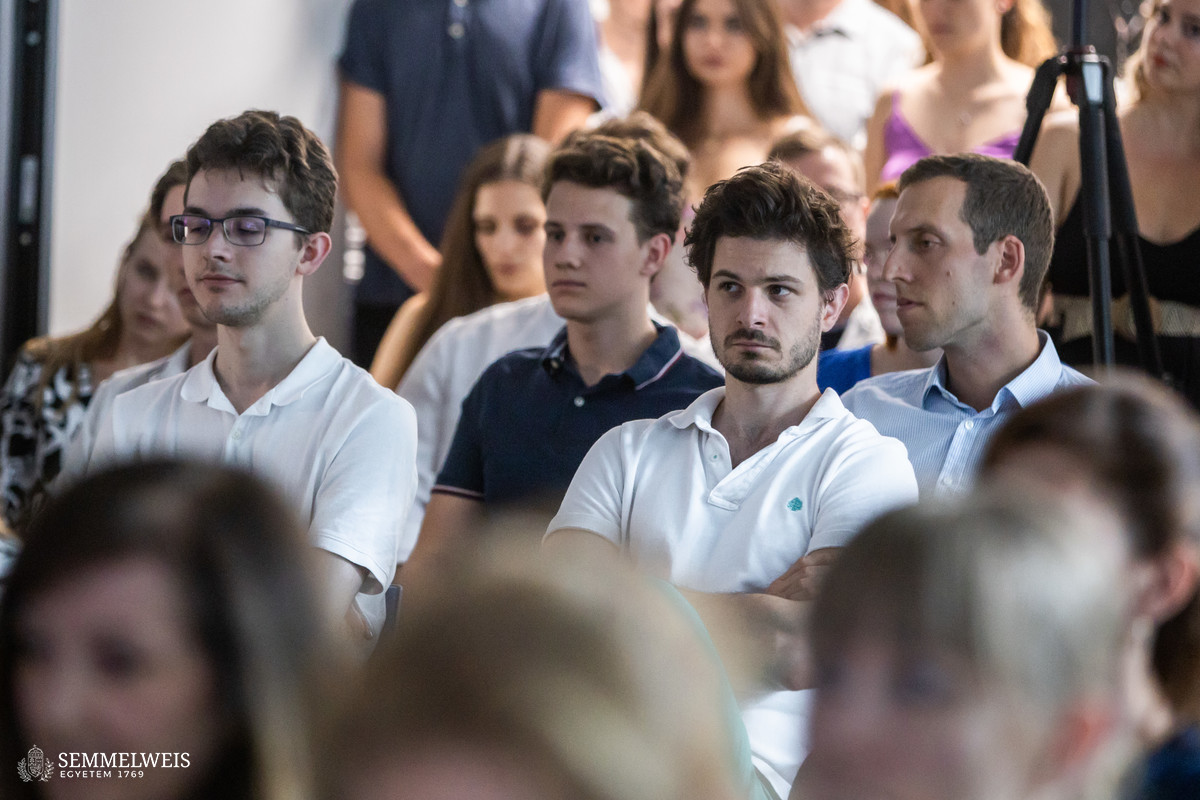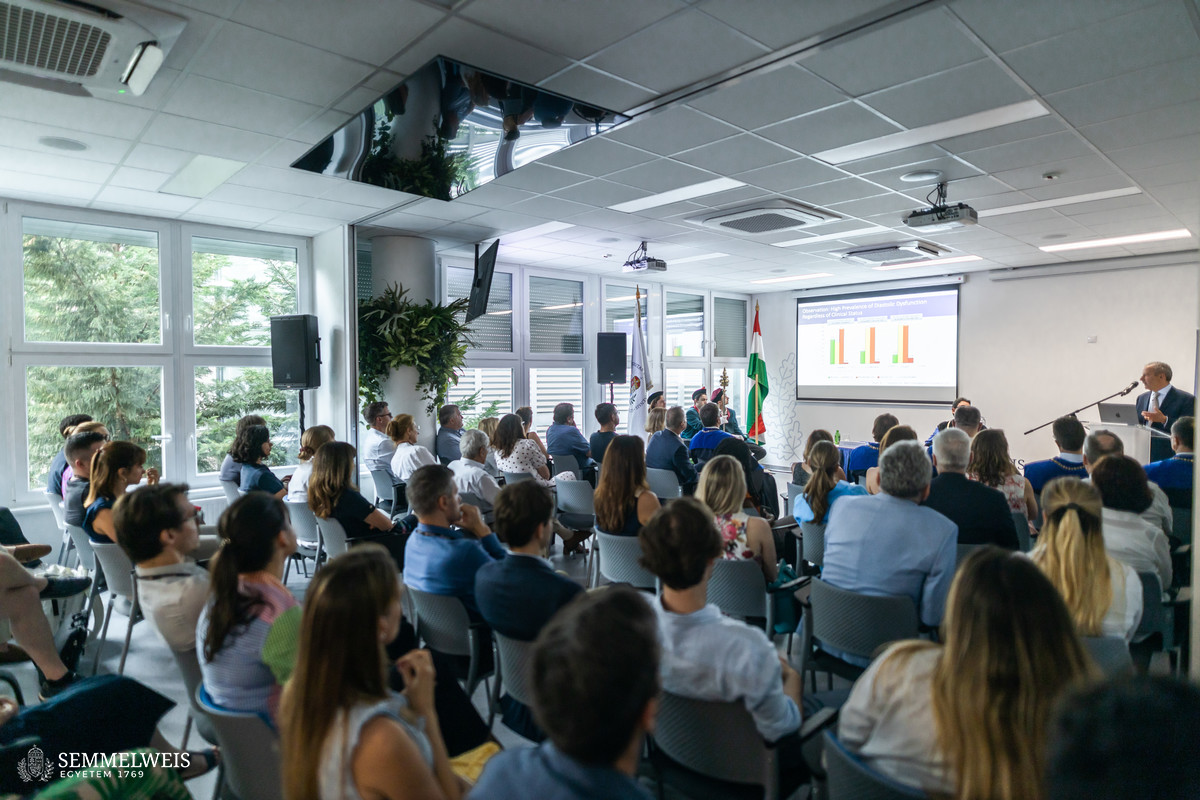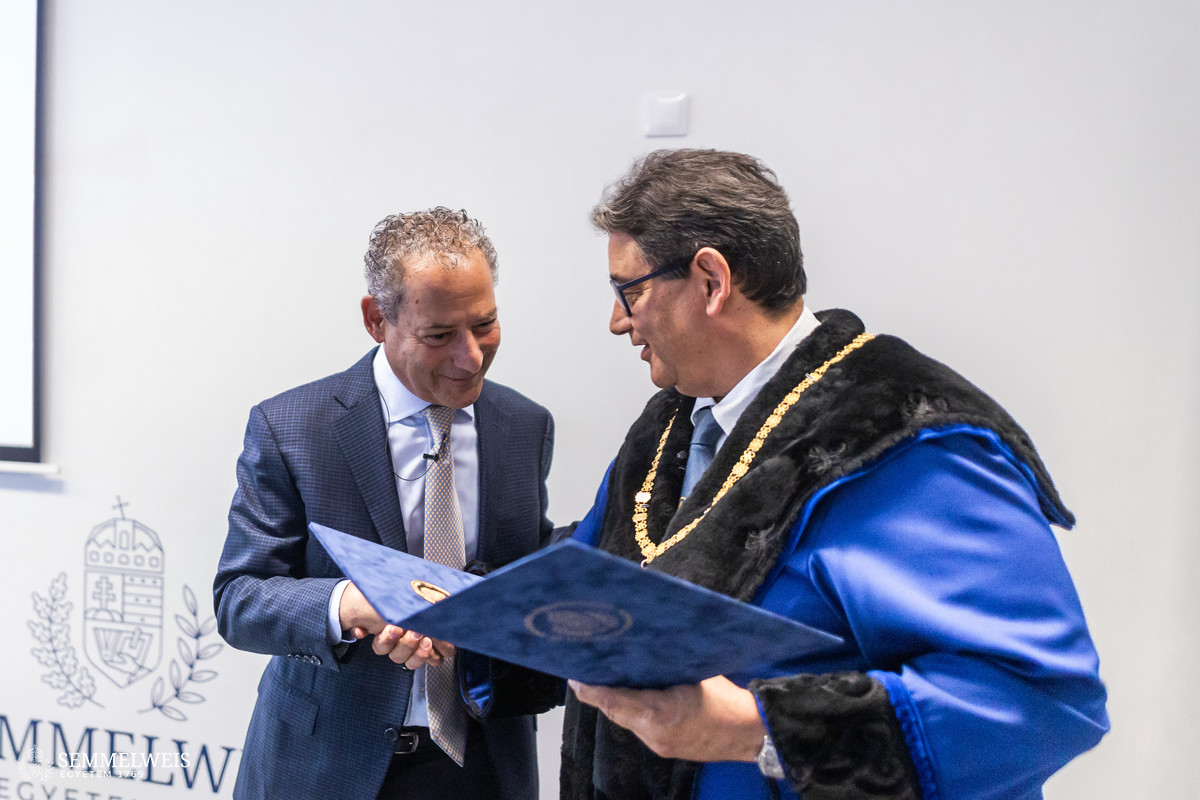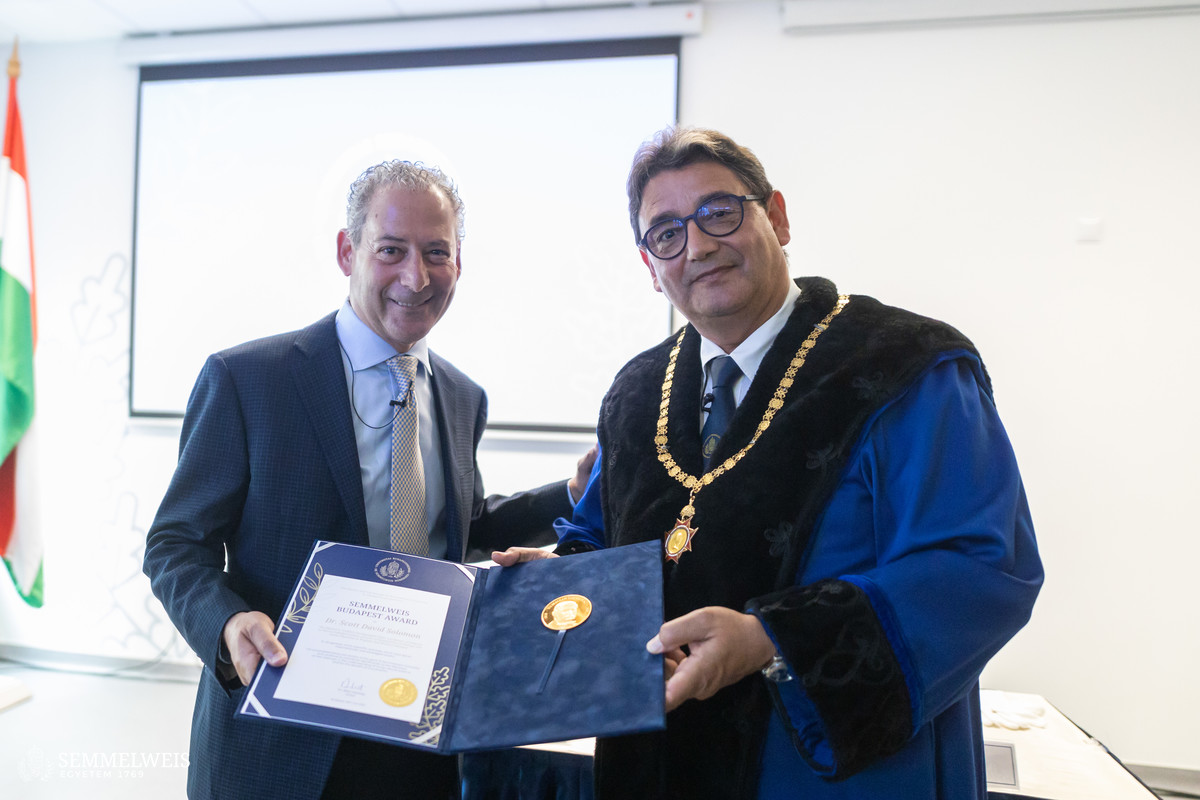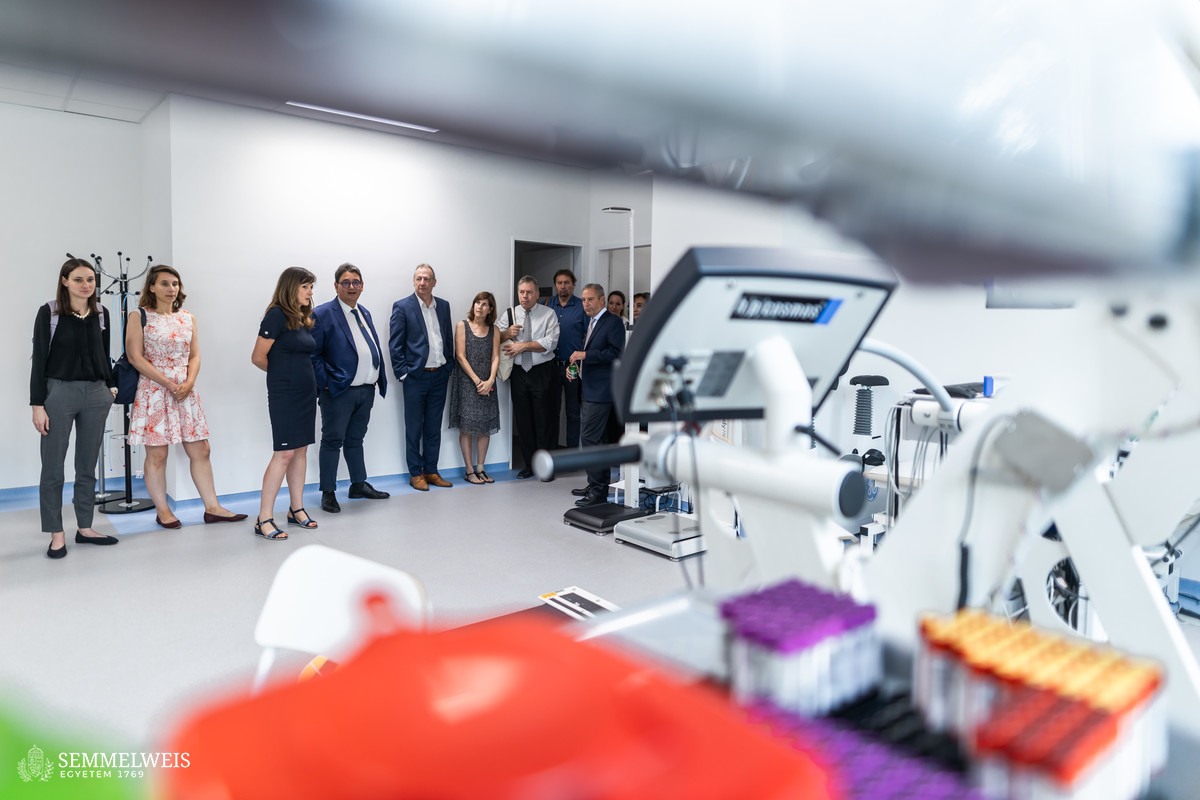At the award ceremony held at the Városmajor Heart and Vascular Center, Dr. Béla Merkely reminded that the university’s highest international award is given to world-renowned, outstanding scientists whose achievements are worthy of the spirit of the institution’s namesake.
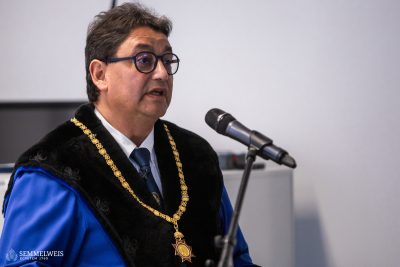 He added that the value of a prize is also determined by the prestige of the institution that awards it. Semmelweis University can now proudly say that it has achieved an international reputation among universities of medicine and health sciences. “We are now ranked among the top 250 institutions of higher education worldwide, and in the field of cardiovascular medicine – which is also the specialization of our awardee – we are ranked 43rd,” said the rector.
He added that the value of a prize is also determined by the prestige of the institution that awards it. Semmelweis University can now proudly say that it has achieved an international reputation among universities of medicine and health sciences. “We are now ranked among the top 250 institutions of higher education worldwide, and in the field of cardiovascular medicine – which is also the specialization of our awardee – we are ranked 43rd,” said the rector.
Dr. Béla Merkely then explained that the institution has a long-standing good relationship with the world-renowned cardiologist of Harvard University. The cooperation with the Heart and Vascular Centre at Városmajor has been going on for more than a decade. During this time, 14 joint publications on the drug and device treatment of heart failure have been published, and the clinic has been involved in a number of landmark trials. Professor Solomon was awarded an honorary doctorate by Semmelweis University in 2018.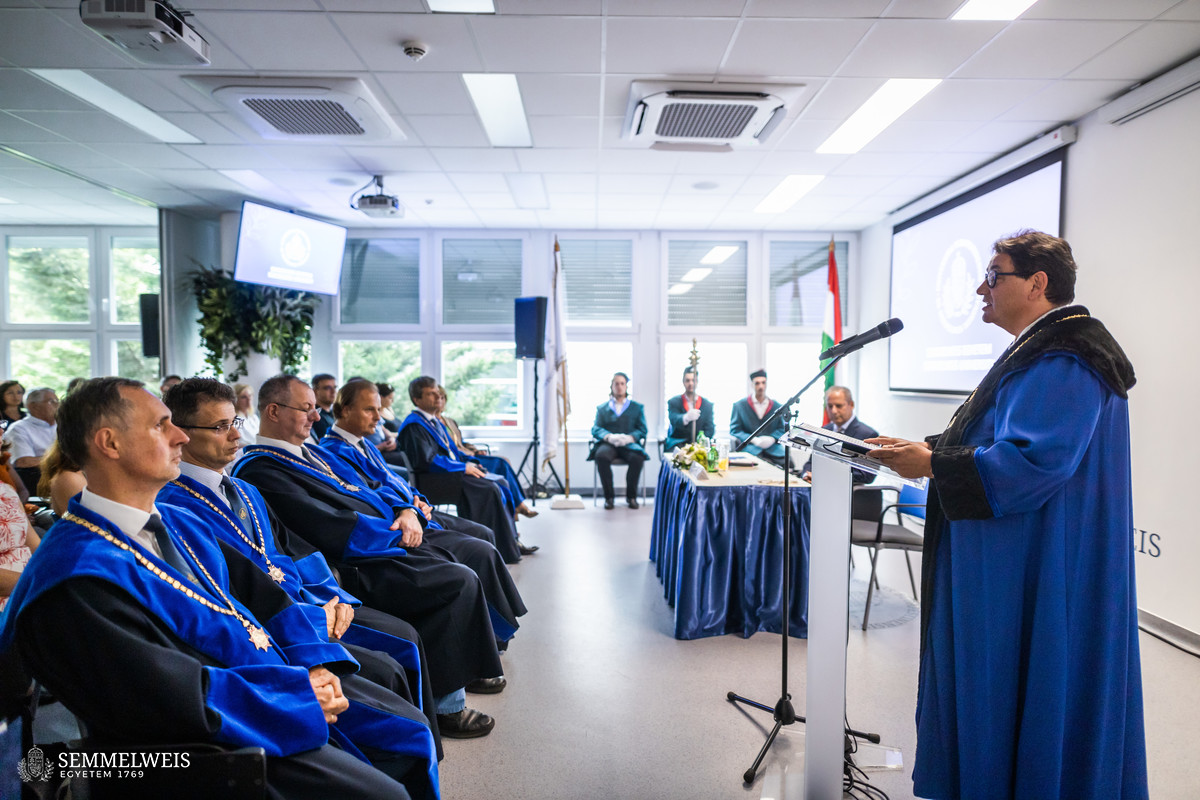
Dr. Scott David Solomon’s main areas of research include structural or functional changes following myocardial injury, the reduction of risk factors in patients with chronic heart failure, and the impact of non-cardiovascular therapies on the cardiovascular system. His work has been pioneering in many respects, for example, he was one of the first to use cardiac imaging techniques to develop cardiology drugs and devices for clinical trials.
After receiving the Semmelweis Budapest Award, Dr. Scott David Solomon gave a comprehensive presentation on what Ignác Semmelweis’ intellectual legacy means to him in the fight against heart failure. He started out by saying that he is truly honored to be presented with the award, especially since they are celebrating a partnership between Semmelweis and Harvard University, adding that he is extremely proud of the strong and lasting bond between them. He called Ignác Semmelweis an innovative and pivotal figure, and pointed out that the themes which characterized his career are still relevant to many of the scientific and academic endeavors they pursue today – and especially relevant to the story of how improvements have been made in the treatment of heart failure over the past 40 years.
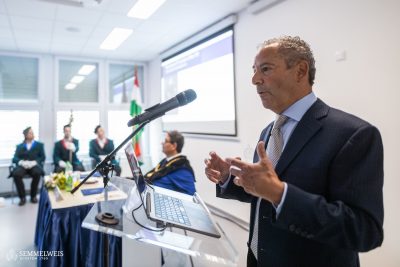 In essence, Dr. Scott David Solomon paralleled the key features that led to the world-famous contributions of Ignác Semmelweis to the key elements of clinical research, which are observation, skepticism, serendipity, testing and perseverance. First of all, he recalled that in the 1980s, they tried to understand heart failure through myocardial infarction, and he has learned a lot from observing two lines of research converging from ’giants’ such as Dr. Eugene Braunwald and Dr. Edward Frochlich, with the help of Marc and Janice Pfeffer as postdoctoral fellows. He noted the importance of ventricular remodeling, and its testing through therapies to attenuate remodeling in rats. It all has led to the HEART Study in 1990 which he considered as one of the milestones, aiming to understand changes in cardiac structure and function after a myocardial infarction, among many else. He stressed that „rigorous testing and perseverance in the face of failure” was probably quite similar to what Semmelweis could have experienced during his career.
In essence, Dr. Scott David Solomon paralleled the key features that led to the world-famous contributions of Ignác Semmelweis to the key elements of clinical research, which are observation, skepticism, serendipity, testing and perseverance. First of all, he recalled that in the 1980s, they tried to understand heart failure through myocardial infarction, and he has learned a lot from observing two lines of research converging from ’giants’ such as Dr. Eugene Braunwald and Dr. Edward Frochlich, with the help of Marc and Janice Pfeffer as postdoctoral fellows. He noted the importance of ventricular remodeling, and its testing through therapies to attenuate remodeling in rats. It all has led to the HEART Study in 1990 which he considered as one of the milestones, aiming to understand changes in cardiac structure and function after a myocardial infarction, among many else. He stressed that „rigorous testing and perseverance in the face of failure” was probably quite similar to what Semmelweis could have experienced during his career.
Along the aforementioned themes of observation and skepticism, the professor also raised attention to the fact that beta-blockers were once contraindicated in the treatment of heart failure, only to realize later on that beta-blockers actually have a beneficial effect on patients. Dr. Solomon also noted that diastolic heart failure as such was once an appealing concept, but then research made it clear that diastolic dysfunction, in fact, increases the aging naturally. After getting into details about the research on heart failure with preserved and mildly reduced ejection, one of his fields of expertise, we went on to appreciate the collaboration with Semmelweis University on the PARAGON-HF trial, the one with Semmelweis turned out to be a number one enroller worldwide.
Dr. Scott David Solomon received his medical degree in 1986 from Harvard Medical School in Boston, Massachusetts. He spent his residency years partly there and partly at the Brigham and Women’s Hospital. He became a Teaching Assistant in 1992, Assistant Professor in 1994, Associate Professor in 2003, Professor of the Internal Medicine-Cardiology Departments of Harvard Medical School and Brigham and Women’s Hospital in 2011. In 2015, he was appointed as The Edward D. Frohlich Distinguished Chair to head the Division of Cardiology in the Department of Internal Medicine at Harvard Medical School and Brigham and Women’s Hospital. He directed the Noninvasive Cardiology between 2000 and 2020, and currently he is the director of the Clinical Trials Outcomes Center and the Cardiac Imaging Core Laboratory.
Dr. Solomon’s research group has studied changes in ventricular structure and function following myocardial injury. With his leadership, they have also conducted research on the modifiers of risk and influences of outcome in patients following myocardial infarction and with chronic heart failure, furthermore, on cardiovascular safety of non-cardiovascular therapies. In addition, they have studied factors that influence the transition from hypertension to heart failure, and heart failure with preserved ejection fraction.
He has pioneered the use of cardiac imaging in cardiovascular drug and device development and use of imaging in clinical trials.
He is an expert in cardiovascular safety and outcomes research, and led the Celecoxib Cross-trials Safety Study, sponsored by the US National Institutes of Health, which project directly informed regulatory agencies about the safety of widely used non-steroidal anti-inflammatory agents.
He is a world-renowned clinical trialist. He and his research group have played a leading role in the development of several heart failure therapeutics, through phase 2 and phase 3 international clinical trials in heart failure, hypertension and myocardial infarction.
A particular research focus has been understanding the epidemiology, pathophysiology, and outcomes in heart failure with preserved and mildly reduced ejection fraction and testing new therapies for these conditions.
Professor Solomon’s collaboration with Semmelweis University’s Heart and Vascular Centre at Városmajor has been ongoing for more than a decade. During this time, 14 joint publications have been published on the drug and device management of heart failure, and he has involved the clinic in several landmark trials, the MADIT-CRT, PARADIGM, PARAGON, GALACTIC-HF, DAPA-HF, DEILVER and FINEARTS studies. In the PARAGON study, which focuses on heart failure in patients with a preserved ejection fraction, the Városmajor Heart and Vascular Centre finished as number one among the participating centers in terms of the number of randomized patients participating in the study.
In addition to that, his relevant scientific contribution too played a role in the fact that the prospective, multicentre, randomized trial of BUDAPEST CRT Upgrade will be published in a high impact factor journal.
Dr. Solomon leads a research group consisting of 8 faculty members, 10 research fellows and 40 support staff. He currently receives, or has received, extensive research support from the NIH and multiple industry sponsors. He has authored more than 1000 peer-reviewed articles, reviews and editorials, three textbooks of cardiac imaging, including Essential Echocardiography. He is listed by Thomson-Reuters as one of the most highly cited scientists for the past 5 years.
He has served as Cardiology Section Editor at UpToDate, Associate Editor at Circulation, International Associate Editor at the European Heart Journal, the European Journal of Heart Failure, and serves as Editor for Braunwald’s Heart Disease, 12th and 13th editions.
Established in 2009, the Semmelweis Budapest Award is given to a professional who has demonstrated outstanding scientific results worldwide, is active in the field of biomedical research, whose achievements are worthy of the spirit of the university’s namesake and who contributes to the discovery of new paths in natural science. Previous winners are:
- 2021 – Dr. Katalin Karikó
- 2020 – Dr. Péter Gloviczki
- 2019 – Dr. Botond Roska
- 2018 – Dr. Petr Widimský
- 2017 – Sir Ravinder N. Maini
- 2016 – Dr. Stefan W. Hell
- 2015 – Dr. Tomas Hökfelt
- 2014 – Dr. György Klein
- 2013 – Dr. György Oláh
- 2012 – Dr. Péter Somogyi
- 2011 – Professor Sir George Radda
- 2010 – Professor Jeremy K. Nicholson
Viktória Kiss
Photo: Bálint Barta – Semmelweis University
